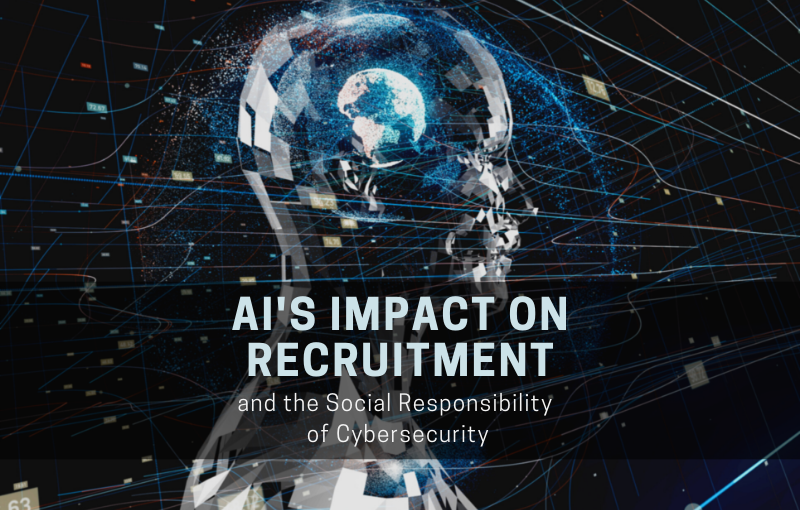
How AI Can Improve Company Recruitment
Unless you’re in the recruiting field, you may not know all the work it takes to get a position filled. Between screening resumes and candidate backgrounds, recruiters work 13 hours per week to find the right candidate for one open position. This time is spent doing tedious tasks that can be automated with the right technology.
Artificial Intelligence has the ability to help recruiters with this. By automating these tasks, recruiters can free up more time to directly communicate with their prospects. Instead of spending hours searching for them online. However, there comes the social responsibility that recruiters have to keep this information secure from any cyber-attacks.
Save Time by Automating Tasks
As mentioned, recruiters spend a lot of time scanning candidates and searching through LinkedIn to try and find the perfect professional for the position they are trying to fill. This can take hours and even though recruiters are looking, it doesn’t guarantee that they will find the right person in these efforts.
Unfortunately, many of the people who are looking for jobs are overqualified for the positions they apply for. With this in mind, it makes it more challenging for recruiters to pick out the perfect candidate. Fortunately, AI software has the ability to pull qualified candidates from a pool of resumes.
Through automation, machine learning, and human-made algorithms, this AI recruitment technology is able to scan the Internet, or a pool of resumes provided. From there, it can check their experience, criminal history, and samples of past work through natural language processing to see if they would be qualified for the position. It also offers suggestions of past and active applicants for who recruiters should interview.
Improve Employee Retention
HR departments and recruiters are responsible for employee retention and finding the right employee on the front end, so they don’t leave a few months into starting their new position. AI can help recruiters make better decisions for who to hire in the first place. It can also help them discover insights about the types of employees to hire.
By retaining information along the employee’s journey through AI, it will help identify touchpoints that the employees went through during their time at a company. If any employee decides to leave the company, the information about their time working there will be recorded. By collecting more and more information about employees, HR teams can make inferences about why they may choose to leave.
From there, companies can use that information to help make better decisions when it comes to hiring new employees. For example, let’s say a marketing firm hires college students with literature and English majors. The company is looking for employees who know how to write well. Then over time, the company notices that these employees leave on average more than employees with more traditional marketing backgrounds. By noticing this pattern, they could then dig deeper into the employee’s sentiment and AI data to realize these employees leave because while they enjoy the writing aspect of their positions, they struggle when it comes to marketing strategy. This then can inform those recruiters to not hire those types of employees in the future.
Keeping Data Safe
It’s important to note however, collecting this type of data comes with a social responsibility to keep it safe from cybercriminals looking to steal information. With so many data breaches happening in the news, it is always better to be safe than sorry and teach your employees best practices for keeping information safe. Just to name a few, consider updating your antivirus software, change your passwords often, and avoid phishing emails.
Cybercriminals are aware of how many companies are using these types of programs and take advantage of it. They look to steal this information through phishing tactics and tricking employees to download malware to their company devices. However using the best software and the best safety protocol, you can be sure your information will stay secure.
Allow for Automated Communication
Automation is one of the biggest components in using AI, and recruiters can benefit from this as well. Job hunters have made it clear that they are looking for communication with the businesses they are interested in working for. They want to be able to touch base with the HR teams and learn more about a company before they decide to work there. This can take up a huge part of a recruiter’s job and oftentimes businesses hire someone to do this as a full-time position.
Now, companies are starting to use chatbots and digitized interviews to talk to their prospects. Chatbots can be used for real-time interaction through the power of AI. Companies are auto-filling these bots with typical frequently asked questions in their algorithms. Then when a prospective employee interacts with the chatbot, they can get the answers they need without someone answering the same tedious questions repeatedly. If the person needs more one-on-one care, they can then select the option to talk to a real person.
AI has been useful for many different types of businesses and positions. Recruiters have been able to already take advantage of this software through chatbots. However, AI has a long way to go before it becomes the norm in recruitment. If companies keep the bar high when it comes to new hires, there’s a chance more recruitment and HR teams will be utilizing the power of AI for a more effective and time-efficient recruiter.
Authors
Ryan Leary
Ryan Leary helps create the processes, ideas and innovation that drives RecruitingDaily. He’s our in-house expert for anything related to sourcing, tools or technology. A lead generation and brand buzz building machine, he has built superior funnel systems for some of the industries top HR Tech and Recruitment brands. He is a veteran to the online community and a partner here at RecruitingDaily.
Recruit Smarter
Weekly news and industry insights delivered straight to your inbox.






